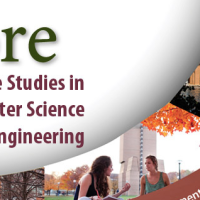
Becoming a Robot Guru 2 @ RSS
CRA-W and CDC are proud to be sponsor the Robot Guru 2 Workshop as part of the Discipline Specific Workshop program.
It is the goal of this workshop to introduce students to the exciting research area of robotics and to provide students currently doing research in robotics with valuable career-building information. Robotics is a very unique field that requires applied engineering, basic science, and strong creativity. The integration of these three areas often proves challenging. Despite this challenge, robots are becoming ubiquitous tools for many daily tasks including manufacturing, package delivery, and in-home assistance. In order to prepare the next generation of robotics researchers, this workshop will address several discipline-specific challenges of robotics and strategies to overcome these challenges including the integration of hardware and software and multi-disciplinary integration required.
Undergraduate and graduate students are the primary audience of this workshop. Scholarships will be available to fund travel and attendance. Underrepresented minorities are especially encouraged to apply.
This workshop will held at the 2016 Robotics: Science and Systems Conference. This conference will bring together researchers working on algorithmic or mathematical foundations of robotics, robotics applications, and analysis of robotic systems.
Speaker: Lydia Kavraki
Dr. Lydia E. Kavraki is the Noah Harding Professor of Computer Science and Bioengineering at Rice University. She received her B.A. in Computer Science from the University of Crete in Greece and her Ph.D. in Computer Science from Stanford University. Her research contributions are in physical algorithms and their applications in robotics (robot motion planning, hybrid systems, formal methods in robotics, assembly planning, micromanipulation, and flexible object manipulation), as well as in computational structural biology, translational bioinformatics, and biomedical informatics (modeling of proteins and biomolecular interactions, large-scale functional annotation of proteins, computer-assisted drug design, and systems biology). Dr. Kavraki has authored more than 180 peer-reviewed journal and conference publications and is one of the authors of the robotics textbook titled “Principles of Robot Motion” published by MIT Press. She is heavily involved in the development of The Open Motion Planning Library (OMPL), which is used in industry and in academic research in robotics and bioinformatics. Dr. Kavraki is currently on the editorial board of the International Journal of Robotics Research, the ACM/IEEE Transactions on Computational Biology and Bioinformatics, the Computer Science Review, and Big Data. She is also a member of the editorial advisory board of the Springer Tracts in Advanced Robotics. Dr. Kavraki is the recipient of the Association for Computing Machinery (ACM) Grace Murray Hopper Award for her technical contributions. She has also received an NSF CAREER award, a Sloan Fellowship, the Early Academic Career Award from the IEEE Society on Robotics and Automation, a recognition as a top young investigator from the MIT Technology Review Magazine, and the Duncan Award for excellence in research and teaching from Rice University. She is a Fellow of ACM, IEEE, the Association for the Advancement of Artificial Intelligence (AAAI), the American Institute for Medical and Biological Engineering (AIMBE), the American Association for the Advancement of Science (AAAS), the World Technology Network (WTN), and has received the Texas Women in Science Award by BioHouston. Dr. Kavraki is a member of the Academy of Medicine, Engineering and Science of Texas (TAMEST), and an elected a member of the Institute of Medicine of the National Academies.
Speaker: Maja Matarić
Maja Matarić is professor and Chan Soon-Shiong chair in Computer Science Department, Neuroscience Program, and the Department of Pediatrics at the University of Southern California, founding director of the USC Robotics and Autonomous Systems Center (RASC), co-director of the USC Robotics Research Lab and Vice Dean for Research in the USC Viterbi School of Engineering. She received her PhD in Computer Science and Artificial Intelligence from MIT in 1994, MS in Computer Science from MIT in 1990, and BS in Computer Science from the University of Kansas in 1987. She is a Fellow of the American Association for the Advancement of Science (AAAS), Fellow of the IEEE and AAAI, and recipient of the Presidential Awards for Excellence in Science, Mathematics & Engineering Mentoring (PAESMEM), the Anita Borg Institute Women of Vision Award for Innovation, Okawa Foundation Award, NSF Career Award, the MIT TR35 Innovation Award, and the IEEE Robotics and Automation Society Early Career Award. She served as the elected president of the USC faculty and the Academic Senate. At USC she has been awarded the Viterbi School of Engineering Service Award and Junior Research Award, the Provost’s Mentoring Award and Center for Interdisciplinary Research Fellowship, the Mellon Mentoring Award, the Academic Senate Distinguished Faculty Service Award, and a Remarkable Woman Award. She is featured in the science documentary movie “Me & Isaac Newton”, in The New Yorker (“Robots that Care” by Jerome Groopman, 2009), Popular Science (“The New Face of Autism Therapy”, 2010), the IEEE Spectrum (“Caregiver Robots”, 2010), and is one of the LA Times Magazine 2010 Visionaries. Prof. Matarić is the author of a popular introductory robotics textbook, “The Robotics Primer” (MIT Press 2007), an associate editor of three major journals and has published extensively. She serves or has recently served on a number of advisory boards, including the National Science Foundation Computing and Information Sciences and Engineering (CISE) Division Advisory Committee, and the Willow Garage and Evolution Robotics Scientific Advisory Boards. Prof. Matarić is actively involved in K-12 educational outreach, having obtained federal and corporate grants to develop free open-source curricular materials for elementary and middle-school robotics courses in order to engage student interest in science, technology, engineering, and math (STEM) topics. Her Interaction Lab’s research into socially assistive robotics is aimed at endowing robots with the ability to help people through individual non-contact assistance in convalescence, rehabilitation, training, and education. Her research is currently developing robot-assisted therapies for children with autism spectrum disorders, stroke and traumatic brain injury survivors, and individuals with Alzheimer’s Disease and other forms of dementia.
For more information, please visit: http://www.cs.unm.edu/amprg/robotGuru16/scholarships.php
 Explore Graduate Studies in CSE Workshop
Explore Graduate Studies in CSE Workshop



